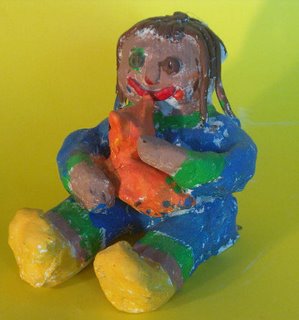Children's Art 2: "ME"

In 2000, the Brisbane children's theatre festival, "Out of the Box", included an exhibition called "ME" in which some 15 schools in SE Qld took part under the direction of Raquel Redmond, a children's art specialist from Bardon, Brisbane. Using a great variety of different media: from charcoal or pastel on paper, paper-clay or mixed media sculptures, to bead and bow applique on cloth dolls , children aged 5-7 from various backgrounds were invited to create a representation of "Me". I was lucky enough to help out with a couple of the workshops.
What struck me most clearly - even more than the beauty of the finished creations- was the certainty with which these un-inhibited children were able to express "themselves". There was no freezing before the daunting white sheet. In front of an array of ribbons and bows and buttons and felt, a child's hand would reach out, hover for a moment in reflection, and then go directly ("instinctively") to eg a hunter green plaid stripe for the central strip of a shirt, or purple wool for fluffy pony tails. They all generally worked in an atmosphere of satisfied silence, in which handling the materials was not the least pleasure, and they all seemed to know exactly when something was finished, even though they worked in remarkably different ways: some finishing in a few minutes, others taking an hour or so to get things exactly right.
The results always both looked nothing like and yet exactly captured the kid, or the kid at that particular never to be repeated moment of time.
I was struck by this partly because adults, or even older children- find it hard to work so freely. They ARE daunted by the white sheet, and also by "what people will think" of what they create, of "how it will compare" to what others have created, are creating around them. They also are busy thinking of the finished product, the item to be hung, frozen in time, instead of the intense engagement in the process which characterises the younger artist. There has insidiously become a focus on an endpoint, a gold standard, and the possibility that "ME": that ephemeral, ever-changing centrality unique and consistent unto itself, could be rated: good, bad, clever, lopsided, pretty, ugly.
I loved watching the kids instinctive art-making so much that I approached my friend Jan Cattoni (who later directed our journey, "After Maeve") to see if it might be possible to record the making of the "ME" exhibition - but I had not left enough time to coordinate the necessary resources. I am happy that one of the outcomes of the film we have ended up making together is that both Maeve and Tara are captured essentially through their own unique expressions of themselves (in art and in dance) - and also that it is inspiring parents to try to guide rather than inhibit the unique expressions of their never-to-be-repeated children- and perhaps even to have a go themselves at splashing out, without focussing on the finished product.
